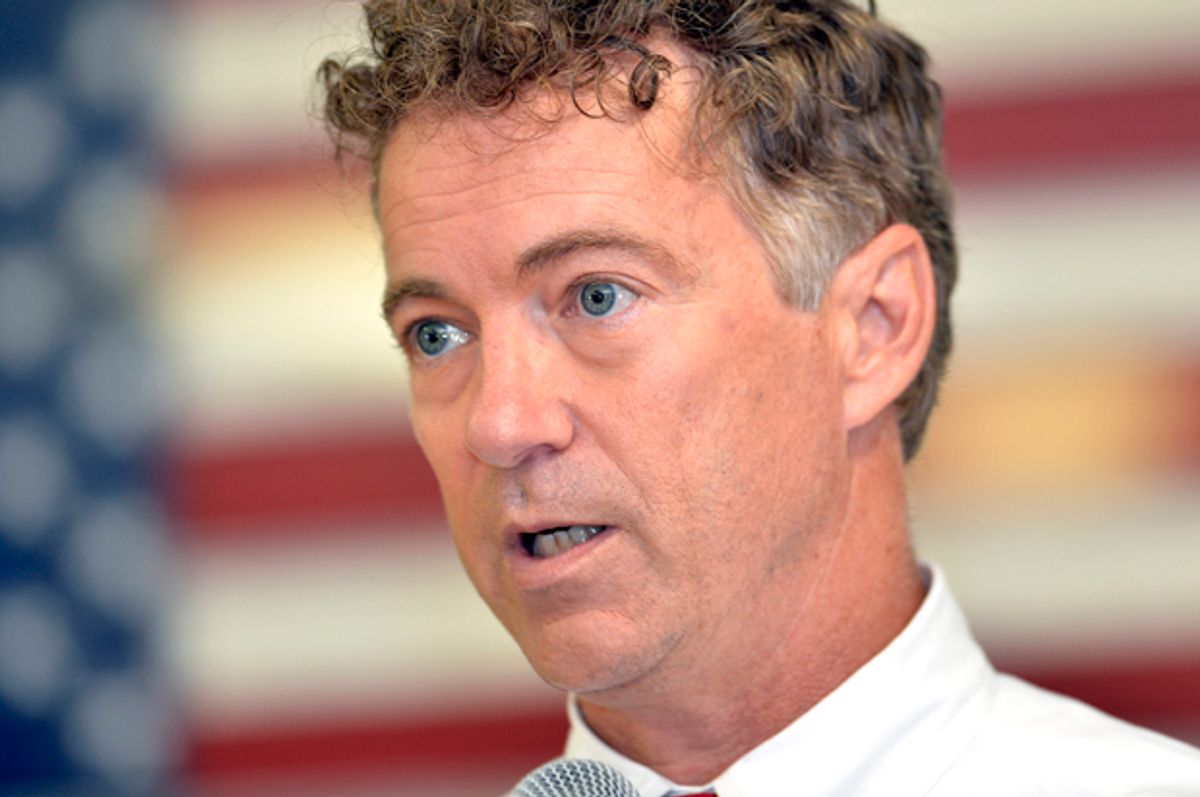Rand Paul’s presidential campaign has been stuck in a protracted skid lately. The candidate who was supposed to be the exciting, new thing – the “different kind of Republican” – has seen his support in national polls nosedive to the point that he’s barely cracking the top ten. In Iowa and New Hampshire he’s on a slow, steady downward trajectory. He didn’t make an impact at the first big primary debate, fundraising hasn’t been especially strong, and his campaign is pushing back against press reports that it’s riven with internal divisions. The rise of Donald Trump seemed to catch them completely off guard, and they responded by first making a big show of not engaging with Trump, and then making a big show of how aggressively they were engaging with Trump.
Oh, and a number of Rand’s political allies were indicted on campaign finance violations related to his father’s 2012 presidential run, including the longtime aide he chose to run his super PAC.
After all that, Rand Paul really needed some good news, and this past weekend he finally got some. Under intense pressure from Team Rand, the Kentucky Republican Party voted to change its presidential primary to a March 5 presidential caucus. Rand sought this change because he wants to run for president and for reelection to the Senate at the same time, but Kentucky law prohibits a candidate’s name from appearing twice on the same ballot. The switch will allow Rand to circumvent that law and retain the ability to run for Senate if/when his presidential bid flops.
Of course, that bit of good news didn’t come cheaply. Presidential caucuses are labor-intensive affairs that require a good deal of time and money to set up, and while the Kentucky GOP may have been willing to reengineer the machinery of state politics to accommodate Rand Paul’s political ambitions, they were less keen on footing the bill for it. As such, Rand’s campaign is on the hook for $250,000 to pay for the caucus, which they have to pony up before the middle of next month or the state automatically reverts back to a primary.
Regardless of how one feels about the state law at the center of all this, the solution arrived at by Rand and the Kentucky GOP comes off feeling pretty scummy, given that the change was agreed to mainly because Rand promised to pay for it. As Steve Benen observes: “We’ve all heard about attempts to buy an election. This offers a literal example of the phenomenon.”
And while Paul ultimately did prevail, it wasn’t a sure thing, and it was almost derailed by Paul himself. According to the Lexington Herald-Leader, Kentucky Republicans had come to view Paul’s scheme with suspicion given his campaign troubles and the fact that he wrongly claimed to have already transferred the funds for a caucus to a state GOP bank account. During a conference call intended to assuage those concerns, Paul argued that the party should just trust him because he’s Rand Paul:
Republicans wanted to know why Paul was waiting until the proposal passed at the state central committee meeting this Saturday, and Paul responded that there was no need to transfer the money unless Kentucky's Republicans don't trust their junior senator.
Trust emerged as a major theme from Paul, and it appears that will be the crux of his pitch when he tries to convince committee members in person at Saturday's central committee meeting in Frankfort.
Still, Paul was asked several times about the money and whose account it is currently in.
That pitch didn’t go over so well. He apparently did such a poor job making his case to the state party that aides and allies of Senate majority leader Mitch McConnell had to step in and hammer out the plan that ultimately convinced enough party members to vote in favor of the caucus.
So Rand Paul came out ahead in spite of himself, and only with the timely intervention of a powerful political ally. The end result of all that drama is that Rand literally purchased himself a bit more time to run for president – an endeavor he doesn’t seem to be especially good at. But voters in Kentucky will get their chance to caucus for Rand Paul in March 2016... assuming he lasts that long.

Shares